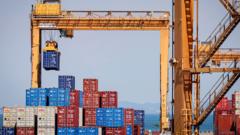WTO predicts a significant decrease in global trade due to escalating US tariffs, with a particular impact on North America as trade tensions between the US and China intensify.
US Tariffs to Trigger Global Trade Decline, Warns WTO

US Tariffs to Trigger Global Trade Decline, Warns WTO
World Trade Organization issues stark warning on economic implications of recent US tariffs.
The World Trade Organization (WTO) has released a concerning forecast indicating that global trade is set to decline this year, primarily attributed to US President Donald Trump's imposition of tariffs. During a press conference in Geneva, WTO Director-General Ngozi Okonjo-Iweala expressed apprehension about the deteriorating relations between the US and China, dubbing it a "really worrying" phenomenon.
The WTO has noted "severe downside risks," including retaliatory tariffs and ongoing political uncertainty. It specifically highlighted North America as facing a trade drop exceeding 10%. Previously, the WTO anticipated a 2.7% growth in global goods trade by 2025, but that projection has now shifted to a forecasted decline of 0.2%.
Chief economist Ralph Ossa articulated that tariffs wield considerable influence as a policy tool, yielding broad and often unforeseen consequences. He added, "Our simulations show that trade policy uncertainty has a significant dampening effect on trade flows, reducing exports and weakening economic activity."
In conjunction with the WTO's statement, the United Nations Conference on Trade and Development (UNCTAD) reported that global growth is expected to slow to 2.3% by 2025, affected by rising trade tensions and uncertainty, which falls below the 2.5% threshold associated with a global recession.
The introduction of a baseline tariff of 10% on nearly all foreign imports to the US took effect on April 5, with certain exemptions. China faces even steeper tariffs, totaling 145% on most goods. In response to this uncertainty, the US stock market experienced a downward trend, reflecting investor trepidation amid the tariffication environment.
Despite the gloomy outlook concerning trade with the US, the WTO does anticipate some regions, particularly Asia and Europe, will still experience modest trade growth in both exports and imports this year. The organization also reported for the first time a forecast for services trade, predicting a 4% growth by 2025, indicating a slight downward revision from previous expectations.
President Trump's tariffs are presented as a means of encouraging American consumers to prefer domestically-produced goods, increase tax revenue, and stimulate domestic investment. However, detractors argue that revitalizing US manufacturing is a complex and long-term endeavor, likely to impose immediate economic challenges. Notably, shortly after imposing steep tariffs against approximately 60 trading partners, Trump announced a 90-day pause on those tariffs for all but China, responding to backlash from both political leaders and market stakeholders.
The ramifications of these tariffs have even reached the UK, with the Bank of England's governor warning that they could lead to reduced disposable income for British consumers.






















